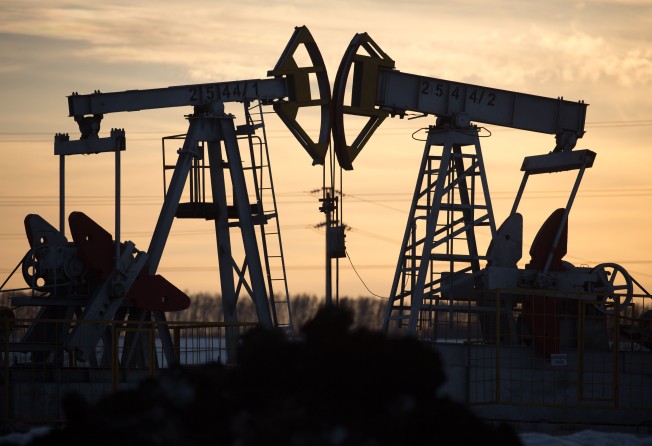Oil price plunge likely to spur China’s quest for energy diversification, despite short term gain, analysts say
- Oil prices have plunged over the past week due to the Saudi-Russia price war, a boon to China because it imports 70 per cent of its oil
- But the fall could hurt Chinese oil companies and is unlikely to affect Beijing’s long term focus on energy diversification, analysts say

A sharp plunge in crude oil prices triggered by a price war between Saudi Arabia and Russia is likely to serve as a wake up call for China.
In the wake of the crash, analysts say the world’s biggest importer of oil will bolster domestic production of both fossil fuels and alternative power sources to address growing energy security concerns and protect its own industries.
In the short-term, lower oil prices make renewable energy sources like solar and wind less competitive, increasing incentives to use traditional energy sources like oil and coal.
But Beijing values long-term energy security over short term gains from lower prices, officials have stressed, meaning it is likely to continue diversifying its energy base.
“On the one hand, the decline in China’s import costs is beneficial” for the economy, said Wang Yongzhong, who leads global energy research at the Chinese Academy of Social Sciences, a key governmental think tank based in Beijing.
“On the other hand, it is also an issue of energy security. If the price of oil is particularly low, below US$30 [per barrel], it will be lower than the production costs of many countries. In this case, many companies may be shut down or go bankrupt, and supplies will be reduced.”
While China is intent on diversifying its energy sources, it is acutely aware of the plight of its own oil and gas sector, which is dominated by state firms such as Sinopec and China National Petroleum Corp (CNPC).
“China is increasing its investment in oil and natural gas exploration because it has to reduce its dependence on foreign countries,” Wang said.
“If oil prices fall, at this price, our domestic companies will basically suffer serious losses, and the state will want some protection for this.
If oil prices fall, at this price, our domestic companies will basically suffer serious losses, and the state will want some protection for this
“It is also for the sake of energy security. Our domestic oil prices may fall, but they will not completely correspond to [the fall of] the international market,” said Wang, adding China’s fuel pricing policy acted as an “isolation mechanism.
In 2016, the National Development and Reform Commission (NDRC), the powerful planning agency, set a price floor for petrol and diesel that would not be adjusted as long as global crude oil was below US$40 a barrel.
The NDRC said the extra revenues from the price floor policy would be put towards financing emissions reductions, fuel quality upgrades and national oil security enhancement initiatives.
The mechanism may be activated again to protect upstream oil production among domestic firms as crude prices have fallen below production costs, investment bank China International Capital Corporation said in a research note this week.
The price of Brent crude, the international benchmark, fell 4.85 per cent to US$33.95 on Thursday afternoon, after it plummetted 24 per cent on March 9 due to the price war.
The share of natural gas in China’s total energy consumption will go up to 14.2 per cent by 2035 and 16.4 per cent by 2050 from 8 per cent in 2018, according to a 2019 forecast by the CNPC Economics and Technology Research Institute.
The share of crude oil will fall from 19 per cent to 17.4 per cent in 2035 and 15.2 per cent in 2050, the forecast said. Non oil and gas sources, including renewable energy, will make up about 28 per cent by 2035 and 37.8 per cent by 2050, a rise from 12 per cent in 2018.
Despite efforts to reduce its carbon emissions, coal will remain a major energy source for China over the next three decades. It will drop to 40.5 per cent by 2035 and 30.7 per cent by 2050 from 59 per cent in 2018, said the Economics and Technology Research Institute.
Last year the NDRC approved more than a dozen new coal mining projects.
While fossil fuels will remain China’s dominant energy source through to the middle of the century, the government is continuing to push for development of renewable energy sources.
Chinese President Xi Jinping has emphasised “high quality growth” that includes environmental protection and green development.
China said last year it would launch a series of subsidy-free wind and solar projects in 2019 to take advantage of a rapid fall in construction costs since 2012. The Ministry of Industry and Information Technology also said in January it would not make significant cuts to its new energy vehicles subsidy this year, after several adjustments since it was introduced in 2016.
Faced with lower oil prices and plummeting car sales, the cost of switching to renewable energy is likely to increase, analysts said.
“There may be some short-term economic costs if there is a one-to-two year period of low oil prices,” said Rory Green, China economist at TS Lombard.
“However, the structural trend of decarbonisation is here to stay. Even with low oil prices, developed nations led by Europe will push for reduced consumption of fossil fuels, China’s investments in green energy put it in a good place to profit from this ongoing development.”
Wang said the share of renewables in China’s overall energy market was still relatively small.
“At present, China will consider economic issues, cost issues, and the fact that 70 per cent of oil was bought overseas. But I think [Beijing] will support renewables,” he said.